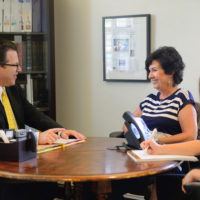Long-Term Care and Medicaid Law

The Small Print: This is an article on a fast-changing and complicated area of the law. The reader should not rely upon any information in this article as legal advice relative to a specific person or issue but rather should consult qualified counsel for up-to-date and customized advice and information.
I. An Introduction to the Medicaid Program
Medicaid is the primary government program which helps pay for long-term care. Medicaid pays all or some of the costs for home care, assisted living, nursing home care and other supports but only if a person is first proven to meet financial need standards set by the government.
Because Medicaid is both a state and a federal program, it means that we have 51 different Medicaid programs in the United States (all 50 states plus the District of Columbia participate) and the rules for each are constantly changing. Rules on who is eligible vary from state to state. Rules on what programs can be offered and how those programs are administered also vary. Because many clients have connections with more than one state, these differences create practical consequences in advice and is a fertile ground for malpractice claims. The Medicaid laws are based on federal statutes (mostly from Title 42 of the United States Code), state statutes, federal agency rules (e.g., the Social Security Administration, the Centers for Medicare and Medicaid Services, Internal Revenue Service), state agency rules (in Florida this is mainly the Florida Department of Children and Families, the Agency for Health Care Administration and the Florida Department of Elder Affairs), state court decisions, federal court decisions and agency opinion letters and rulings. Sometimes even more important are local customs and how each agency applies the rules and laws. These rules and laws are often created with little or no input from related agencies or law-making bodies. The courts have consistently referred to the Medicaid laws as the most convoluted and complicated of all of our legal systems with the possible exception of only the Internal Revenue Code.
People who work in long-term care are forced to become familiar with the Medicaid system but mistakes in interpretation and guidance are increasingly common as the rules become more and more complicated. Some facilities, banks and other institutions have brought knowledge in-house; others have outsourced for Medicaid experts. For the elderly, disabled and their families, many more are looking for advisors today than just 5 years ago. There are some very good advisors around but also some very ill-prepared advisors. The book of annual Medicaid denials in Florida is many inches think. This evidences the fact that people are seeking eligibility advice but are sometimes getting that advice from people who may be well intentioned but who have in fact given bad and harmful advice.
This presentation covers a very summary review of Medicaid eligibility and program issues designed for professionals in the elder care community and lawyers who focus on different (but often related) practice areas. These people are already in the field of improving peoples’ lives. At present, Medicaid is a very important tool in helping people through aging and incapacity.
II. Medicaid Programs in Florida
Medicaid is a very large umbrella under which smaller programs are administered. Each state has its own programs but there are more similarities than differences among them. In Florida, there are many different Medicaid programs and some drop off or are added as time goes by. The two programs covered here are Medicaid ICP and the Diversion Program, now falling under the “Florida Managed Care Long Term Care Program.” For ease of explanation, we will stay with the terms ICP Medicaid and Medicaid Diversion as described below.
A. Medicaid Institutional Care Program (ICP): This is the program which covers nursing home care in the majority of Florida nursing homes including those considered among the very best.
What does it cover? The program allows the family to choose the nursing home and pays the full cost of care at that nursing home less a “patient responsibility amount”calculated from income.
Which facilities accept Medicaid ICP? In general, only skilled nursing facilities can accept Medicaid ICP. An assisted living facility is not able to accept Medicaid ICP payments. Most skilled nursing facilities accept Medicaid in Florida including those considered among the very best. Nursing homes sometimes illegally hide the availability of Medicaid but this is rectified through using the right words and procedures during the admissions process.
How it works: Mrs. Baker selects the ABC Nursing Home for her husband. The nursing home normally charges $9,200 each month. Mr. Baker’s income, consisting of his social security and pension, is $2,100.00 each month. From that $2,100, Mr. Baker is allowed to retain (1) a “personal needs allowance” of $35.00 per month (the lowest allowed in the country) (2) a sum which gets transferred to Mrs. Baker to help her sustain household expenses and (3) a sum to reimburse for certain other allowed expenses. In this example, assume that this leaves Mr. Baker with $650.00 of income after subtracting out his personal needs allowance and the amount which can be transferred to Mrs. Baker. If this be the case, Mr. Baker pays $650.00 to the facility and the government pays the rest.
B. Medicaid Long Term Care Diversion Program aka Medicaid Managed Long Term Care: This program covers home and assisted living care in an attempt to divert people from nursing homes.
What does it cover? The program pays for a very full program of services and tools designed to prolong people living in their own homes or in assisted living facilities. The program can pay for home health aides, care management, social services, adult day care programs, respite care, home modifications, bath/shower visits, home cleaning, delivery of meals, electronic emergency notification systems and more. For people who choose to move out of the home, the program can pay assisted living costs. The amount of assisted living payments depend on the facility and separate negotiated agreements.
Which facilities accept Diversion payments? Over 7 million facilities can accept Diversion services in Florida! This is because Diversion services can be delivered in any Florida home plus many assisted living and other care facilities. The list of assisted living facilities participating in the Diversion program has grown rapidly since 2005 when funding was dramatically increased. I am proud to have been a part of the advocacy team that helped expand these programs.
How it works: Mr. Baker’s dementia has progressed rapidly over the past 6 months. Mrs. Baker, his wife and primary caregiver, is holding up well and is getting support but she needs more help with cleaning, personal care assistance and some respite. A case worker gets assigned to the case. The case worker evaluates Mr. Baker and speaks with Mrs. Baker about her needs and capabilities. With a full assessment in hand, the case worker sorts through and assigns appropriate services to the Bakers thereby delaying or avoiding nursing home placement. If Mr. Baker were appropriate for an assisted living facility, the program would pay for a portion of the assisted living costs. Sometimes the government contribution plus the elder’s social security check is enough the pay the full bill at the assisted living facility; other times, there is more a need for contribution. The amount given to the facility depends on how much of the facility’s cost can be attributed to care as opposed to room and board and this information must be presented to the government in the right way to get the fullest benefit.
There are other important Medicaid-related programs in Florida including Program for All-Inclusive Care for the Elderly (PACE) and some can qualify for VA benefits on top of Medicaid. Program eligibility rules vary and can be altered from time to time. Also, some programs have significant funding problems and wait-lists become necessary.
III. New Eligibility Standards
The system requires poverty before people can gain any help from the government for long-term care. The standards for eligibility are so onerous that people are forced into poverty, often spending their lifetime of savings in the last few years of life. By design, the system wants families to “spend down” assets to the Medicaid poverty limits and only then to go on Medicaid. The program with this approach is that while I may then get Medicaid, I have little or no money to pay for everything else I need. In other words, I am now indigent and on the government dole with little or no money left over to pay for all the things I need but for which the government will not pay. Moreover, if I have a spouse or others dependent on my financial support, those people are on their own because I will have nothing left. This is one reason why the field of Elder Law developed in the 1980s co-founded by my father, one of the true pioneers. Ethical Medicaid planning allows people to legally protect their savings while still qualifying for Medicaid. It is also possible to qualify for VA benefits.











